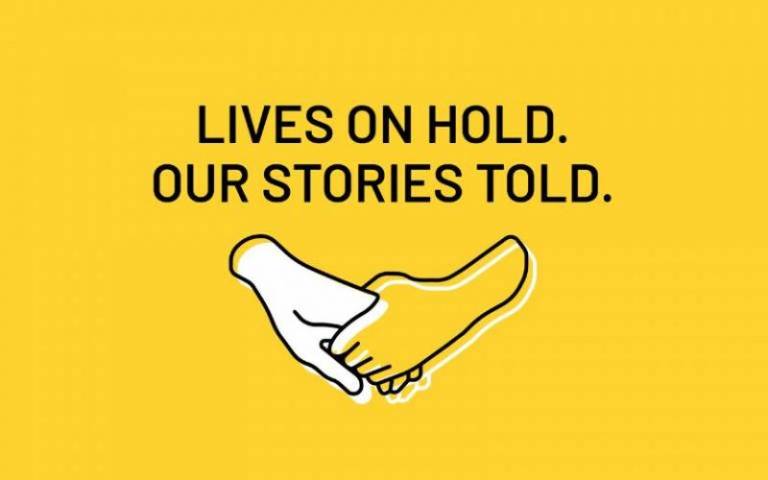'Lives on Hold: Our Stories Told' explores asylum seeker stories during pandemic
6 December 2022
Covid-19 compounded existing problems in the UK’s asylum system, leading to lengthy delays and disruption in essential services for young unaccompanied asylum seekers, finds a study co-coordinated by an IOE researcher.

The ‘Lives on Hold: Our Stories Told’ project is an interdisciplinary effort by UCL, the University of Liverpool and University of Southampton, to understand and highlight for the first time the experiences of unaccompanied asylum-seekers aged 16-25 in the UK during the pandemic.
Professor Elaine Chase (IOE, UCL’s Faculty of Education and Society), project co-coordinator said: “Through this research and the film and animation outputs, co-produced with young people, we hope to highlight the complex challenges that many young people seeking asylum have been facing in the context of Covid-19 and the need for urgent policy reform.
“We also see the research as a way of rehumanising what are often rhetorical and detached political debates about asylum and immigration by allowing young people to highlight what is important in their own words and on their own terms.”
The research team found that delays caused by Covid left some asylum seekers waiting more than three years for a decision on their asylum applications, leading to many “aging out” of the protections available to children as they waited for their final decisions from the Home Office. In addition, there was a significant increase in the number of asylum seekers having their age disputed, rising from 21% in 2019 to 66% in 2021, leading to placement in unsuitable or dangerous living accommodations.
The study featured an emphasis on asylum seekers from Albania, finding that they often faced particular delays, exploitation and hostility in the UK as a result of political opposition and misleading media.
The stresses of excess delays and uncertainties, compounded with the isolation of the lockdowns, led to serious impacts on young asylum seekers’ mental health and wellbeing, exacerbated by their limited access to mental health services and separation from social and family networks. A number reported they contemplated or even attempted suicide.
Because of these lengthy case backlogs, government and legal services are overstretched, leaving young asylum-seekers more reliant on charities to provide the support they need.
Over the course of 20 months, researchers interviewed more than 70 asylum-seekers from 13 different countries and more than 50 professionals from a range of government, legal, welfare, education and civil society sectors. The study is the first detailed look at the experiences of young unaccompanied asylum-seekers during the pandemic and its aftermath.
Principal Investigator Professor Helen Stalford, from the University of Liverpool, said: “In a climate of increasing hostility towards asylum seekers, this research shines a light on the challenges and distress experienced by vulnerable unaccompanied children and young people. Their powerful and brave accounts offer unique insights into how the known shortcomings of the UK’s asylum processes have been compounded by Covid-19.
“The fact that so many young asylum seekers face age assessment and reach adulthood before their claims are processed raises serious questions about the value and effectiveness of existing children’s rights protections for immigrant children.”
To highlight their findings, the team produced a short documentary and accompanying animation featuring the stories of several of the asylum-seekers involved in the study. Speaking anonymously, the young people share their struggles trying to navigate the asylum system, antagonistic Home Office workers, lengthy backlogs and isolation during the pandemic.
In addition to telling their stories, the young asylum seekers were involved throughout the research, ranging from setting the research questions and interviewing the participants, to analysing and writing up the data and co-producing the film. This “peer research” method draws on their own experiences to help engage with other young asylum-seekers undergoing similar experiences.
The researchers and participants hope that the project’s findings will inform legal, policy and practice proposals that will better safeguard the rights and safety of these and other children and young people in the asylum system.
“We hope that people will gain a better understanding of the complexities of young people’s situations and why it is crucial that we urgently review current policies and procedures with respect to the asylum system, welfare supports and broader education and employment opportunities for young people seeking asylum in the UK,” added Professor Chase. “Currently policies are not fit for purpose and we would argue that in many cases they increase young people’s vulnerabilities to adversity including social exclusion, exploitation and poor physical and mental health outcomes.”
The LOHST research project is coordinated by the University of Liverpool, UCL and University of Southampton, working closely with the Albanian support charity, Shpresa Programme. It is funded by the Economic and Social Research Council (ESRC) as part of UK Research and Innovation's rapid response to Covid-19.
Also contributing to the work are Dr Ingi Iusmen, Associate Professor in Governance and Policy and Dr Jana Kreppner, Associate Professor in Developmental Psychopathology at University of Southampton and Dr William Shankley, Assistant Professor in Sociology in the School of Sociology and Social Work at University of Nottingham.
Links
- Read the full report
- 'Lives on Hold: Our Stories Told' project
- 'Lives on Hold: Our Stories Told' documentary
- 'Lives on Hold; Our Stories Told' animation
- Professor Elaine Chase’s academic profile
- Department of Education, Practice and Society
Image
'Lives on Hold: Our Stories Told' Logo
 Close
Close

